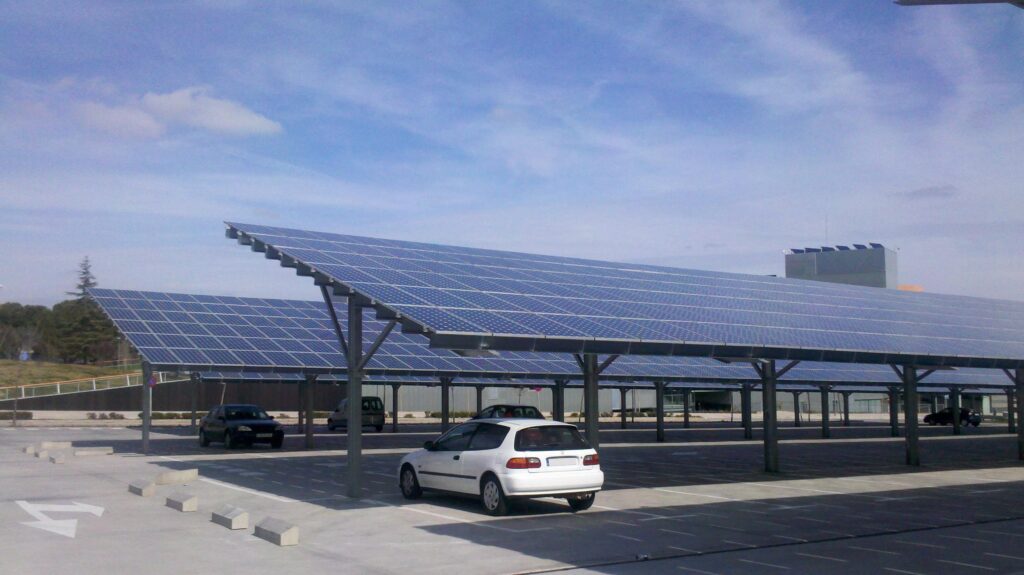Opinion: When It Comes To Solar, It’s Better To Fight Climate Change And Not Each Other

Town Manager Paul Bockelman has suggested using the American Rescue Plan (ARPA) funds that were slated for additional canopy solar panels over the parking at the new Fort River Elementary School to cover next year's regional schools budget shortfall. Photo: Wikimedia Commons (CC BY-SA 3.0)
The following column appeared previously in the Daily Hampshire Gazette and the Amherst Bulletin.
Why would eco-climate activists throughout Massachusetts challenge the siting of industrial solar installations on forests and green lands? Their focus is precisely climate healing, not impeding solar development. But witnessing severe damage by big solar companies, ill-prepared to understand the impact of solar plants on green lands, with no oversight by the state, has forced the matter.
The guest column “Wrongly blocking solar in Shutesbury”, wrongly represents the issue, with misconceptions we hope to clarify, and mischaracterizes Shutesbury’s concerned citizens as local fearmongers. The column’s preposterous claim that “by committing town resources to interfering with solar energy development in the face of climate change, Shutesbury has chosen the side of the climate change deniers” ignores that the town did not initiate the lawsuit pitting solar against forests, W.D. Cowls did.
No one wants to spend precious time and energy fighting each other. We must fight climate change together, but we need holistic strategies that promote renewable energy, reduce consumption, and foster healthy ecosystems. Towns are allowed to regulate most zoning in Massachusetts because they know their local conditions best.
Shouldn’t this apply to towns protecting their water supply and striving for climate solutions?
The notion that the emissions reduction from cutting forests to install solar offsets the carbon value of trees is a false choice, short-sighted and can’t be accurately measured yet. Solar installations have a 25-year lifespan, while mature forests are irreplaceable and essential for climate healing, regulating the water cycles, nutrient cycling and preventing biodiversity collapse (arguably a greater threat to survival).
Clear-cutting destroys the soil structure, leaving the land vulnerable to more erosion, flooding, drought, fires, disease and over 50% of the carbon stored is in the soil. Solar energy is a very important tool, but not the panacea we wish it to be. Sourcing and decommissioning solar present environmental justice and toxicity problems. Our manmade technologies cannot remove carbon dioxide already in the atmosphere.
The Dover Amendment allows municipalities to regulate solar for public health, welfare and safety. Regulation is consistent given that our forests help filter drinking water, clean the air, prevent erosion and sedimentation, and support essential biodiversity. Moreover, this exemption was written in 1985, before large industrial scale solar installations were even conceived. Designed to protect from neighbors objecting because rooftop solar panels are “unsightly,” the archaic law is now being used by developers to bully towns, remove local control, and sue them when they object.
The assumption that we have to sacrifice green lands for solar energy was addressed by the DOER Technical Potential of Solar study, finding that Massachusetts has 15 to 18 times the solar potential we need to meet the CECP 2050 climate goals. The report states “Because of the amount of suitable solar potential identified, we can be aggressive with our solar policy while balancing land use priorities and protecting our natural resources.” Showing that developing substantial solar energy using already disturbed landscapes is possible.
The private sector, town governance, state, federal and international policies need to be in sync. Gov. Maura Healey’s administration recently announced the Forests as Climate Solutions plan to preserve forested land, expand forest reserves and update forest management practices, guided by the Healthy Soils Action Plan, the Resilient Lands Initiative and the Massachusetts Clean Energy and Climate Plan land preservation goals. Solar siting is on the list of key actions. The IPCC has repeatedly urged we remove and store carbon from the atmosphere by supporting forests, wetlands and soil health, in addition to reducing burning of fossil fuels.
The recent crop losses from frost and devastating flooding our farms suffered should alert us to the need to support regenerative and soil building practices, not allow Massachusetts solar incentive policy to jeopardize future farm production. Creative natural solutions combining the latest climate science with Indigenous wisdom, like agroforestry, would help ensure climate resilience and food security.
The state should establish subsidies that support landowners to steward the land for optimal health rather than subsidizing large solar corporations to clear-cut forests and incentivize solar on all appropriate available space before destroying natural landscapes or habitats.
Stewarding the land with integrity requires respecting nature which has always regulated the climate, until humans thinking they knew better destroyed the very ecosystems their lives depend on. The irony is now in the eleventh hour we are scrambling to save ourselves while continuing to sacrifice our forests. Earth is not our vending machine — it’s our temporary miraculous home.
We have broken natural law. There is no manmade law that should override that.
Lenore Bryck is writing on behalf of SmartSolarWMass and the Regenerative Farming, Forests and Food Systems Group of Climate Action Now.
